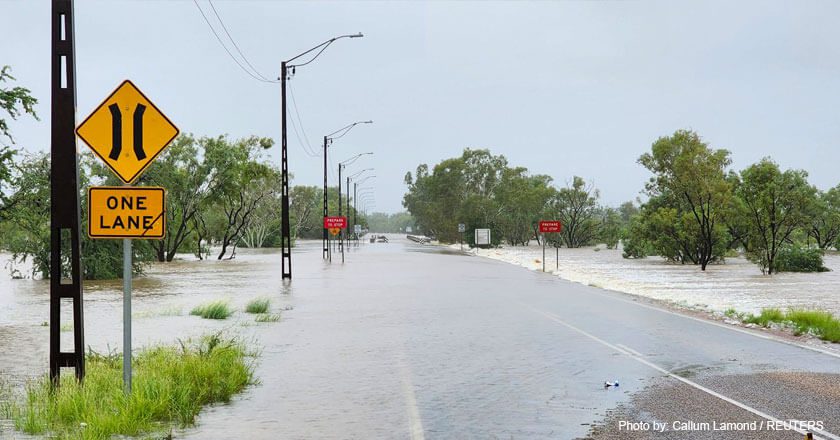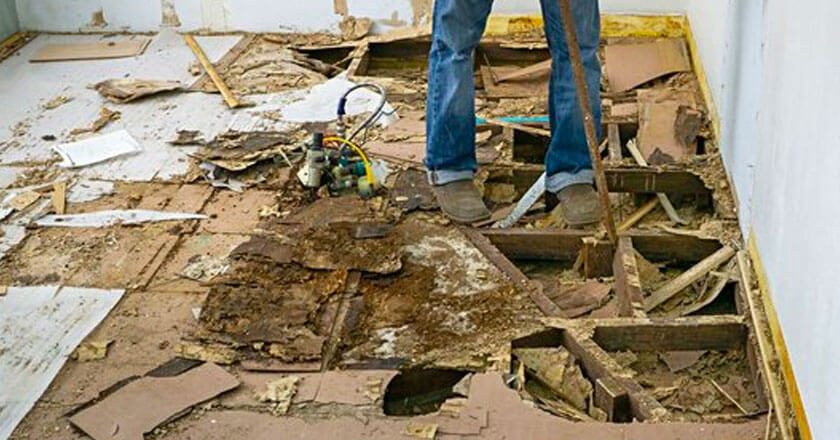The Secret why Aluminum Barriers can Build a Flood-free home
March 5, 2021 | Created by: Andreas Klippe | Comments

Try to put your place in the kitchen and name all of the utensils you have there. Probably, most of these kitchenwares such as spoons, forks, knives, and cooking pots are made up of aluminum.
Who would have thought that this same aluminum can be used as flood barriers and can save and protect you from floods? Let’s discover the secret on why aluminum can build a flood-free home.
Development of Aluminum

You might be asking why we are using aluminum for these flood barriers. Curious? Before discussing its features, let’s first understand the development of aluminum in the world.
Also called Aluminium, aluminum was produced by electrolytic reduction from alumina also known as aluminum oxide, discovered by Humphry Davy, an English chemist in 1808. At that time, aluminum was an expensive material and only used for ornaments and luxury items.

Fast forward, aviation is a milestone in the development of the aluminum industry. Coined as the “winged metal” era, aerial vehicles such as airplanes were built by inventors and aviators with aluminum. Historically, American aircraft designers Wilbur and Orville Wright launched the Flyer-1, the very first heavier-than-air and aluminum-developed aircraft flown successfully in the world on December 17, 1903.
Features of Aluminum

Looking back, aluminum was very beneficial to the people from ancient times. In this modern world, aluminum is very useful in aviation, shipbuilding, automotive industries, and also for flood protection.
You might be wondering why various industries use aluminum. Keep reading and you’ll find out.
Durability
Notice this. Aluminum was widely used for making planes, trains, buses, trucks, office buildings, and other constructions due to its strength. According to The Aluminum Association, aluminum is the second-most-used material by car makers because it can really protect passengers in case of accidents since it is strong enough to absorb crash energy.
Aluminum mixed with other elements like silicon, magnesium, and copper creates high-strength alloys which also increases the strength and formability of aluminum. Moreover, aluminum parts can be engineered to be as strong if not stronger than steel.
Aluminum ensures its lifetime span since it is weather-proof, corrosion-resistant, and immune to the harmful effects of UV rays.
Light-weight
As was said earlier, aluminum is as strong as steel, only lighter. It’s actually a third of the weight of steel, specifically 2.7 g/cm3. With the lighter weight of aluminum, you can definitely transport or handle it easily. For instance, with the flood barriers, you can’t use steel because of its heavyweight.
Looking back, aluminum was very beneficial to the people from ancient times. In this modern world, aluminum is very useful in aviation, shipbuilding, automotive industries, and also for flood protection.
Corrosive Resistance
You might be curious if these flood barriers may be prone to rust. Aluminum contains natural oxide coating which serves as a protection against other elements, that’s why this metal can really avoid and withstand rust.
Furthermore, with regular maintenance like polishing or painting, it can withstand even the harshest elements. According to AZO Materials, Aluminum can be improved through anodizing, painting, or lacquering.
Recyclability
It is also important to note that aluminum is 100 % recyclable, making it a more cost-effective material for production. Also, it only requires only about 5 % energy which is a very little amount for the recycling process. Consequently, it will reduce greenhouse gasses which can also help the environment.
ALUMINUM AS FLOOD BARRIERS

Flood protection barriers should also be made of the best quality:
- Durable
- Lightweight
- Corrosion-resistant
- Recyclable
Floods are not just water, it can be highly pressurized and also flow with floating debris. Traditional flood control barriers are not enough solutions for such a problem. In my previous blog about sandbags, I stipulated the reasons why these outdated flood solutions are not enough. What we need are flood control solutions that are modern and with quality!
Aluminum flood control barriers can be used for 50 years or longer! The return of investment payoff after the first flooding engagement. They can be deployed single-handedly by a trained person as well since they are lightweight. Still, in spite of it being lightweight, they are designed heavy-duty and can withstand strains coming from floodwaters and debris.
Being exposed to floodwater is also not a problem because these aluminum flood-control solutions can withstand damage caused by oxidation or other chemical reactions. After the flood, these barriers can be cleaned by mere water.
Aluminum barriers have already flood-protected many different kinds of properties like malls, houses, and even an education city. Actually, in December 2019, the RS Flood Experts protected 11 buildings in Doha Education City.
Aluminum barriers that have “Quality Made in Germany” seals are the modern solutions to flood problems around the world. Not only that they are made of aluminum, but they also passed standards set forth by international norms. These flood-protection barriers that have been in the market since 1990 are a way better alternative to sandbags and that can be proven by customers from 37 countries around the world.
Aluminum barriers have already flood-protected many different kinds of properties like malls, houses, and even an education city.”
You can trust aluminum. You use it every day when you cook, and when you eat, or when you drive or travel. Trustful, isn’t it?
To learn more about the latest flood protection technology, subscribe now to our Flood Expert Tips (IF YOU HAVEN’T YET!). Stay safe and flood-free! #






